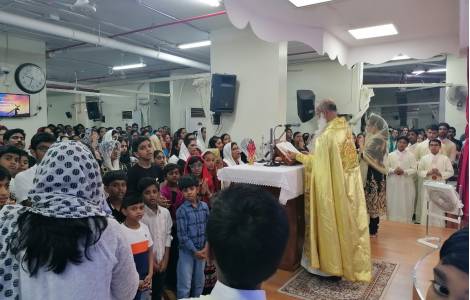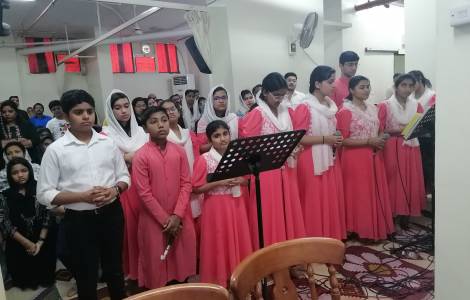
AP
by Antonella Prenna
Abbasiya (Agenzia Fides) – Jilīb is one of the oldest and most populated neighborhoods in Kuwait, divided into five blocks. Of these, block 4 is also known as ʿAbbāsīya. Here is the parish dedicated to Saint Daniel Comboni, whose parish priest is Father Johny Lonis (OFMCap), Episcopal Vicar for the Syro-Malabar faithful of the Apostolic Vicariate of Northern Arabia. Fides met him at the end of a celebration in one of the three "basements" (basements where the Masses are celebrated) belonging to the parish and where the approximately 15,000 faithful of the Catholic community, belonging to different rites and languages, gather.
The parish is located in an area where many Syro-Malabar faithful live, mainly from the Indian state of Kerala, and is therefore also called "Little Kerala". A paraphrase that underlines the crucial role of the Catholic Church in providing spiritual support and accompaniment to people in the diaspora. In recent weeks, Father Johny has had to announce that he and the parish of “Little Kerala” have to leave the apartments and one of the basement rooms at the request of the owners. For this reason, the Apostolic Vicar of Northern Arabia, Bishop Aldo Berardi O.SS.T., is in contact with the local authorities so that new accommodation can soon be found to accommodate the current missionaries and where they can continue to celebrate Holy Masses.
"The parish of Saint Daniele Comboni in Abbasiya is of great importance to the Christian community in South India that he serves," Father Johny begins. The parish consists of three "basement rooms" and four apartments. "All services are held in the basements, reminiscent of the services of the early Church in the catacombs. The apartments accommodate six priests from South India who accompany different rites and language groups. Together with the five other priests present, we celebrate the liturgy according to the Latin, Syro-Malabar and Malankara rites. The language groups present are Malayalam, Konkani from Goa, Mangalorean Konkani and Tamil," says the priest.
"The Syro-Malabar faith community is the most important community in this parish, followed by Malayalam, Konkani, Malankaras and Tamil," emphasizes the priest.
"Our aim is to provide a sense of belonging and spiritual nourishment in a place where cultural identity and religious devotion are intertwined. This is a parish of the people, for the people and by the people," emphasizes the Capuchin missionary. "About 250 volunteers work with us free of charge, including catechism teachers, sextons and secretaries, electricians, plumbers and basement workers, sound technicians and volunteers who take care of the day-to-day care of the people."
"Our parish also serves as a center for promoting unity and cooperation among different groups within the community," the Episcopal Vicar continued. "Through shared worship, friendships and special initiatives, people from different backgrounds can meet, bridge cultural differences and build a stronger sense of community. It is a true spiritual center, a symbol of cultural heritage and a beacon of inspiration for service and unity in diversity."
Father Johny also highlighted the growth and development that the Catholic faith community in Kuwait, including the parish in Abbasiya, has experienced over the years, reflecting the general trends of migration and globalization.
"In the late 1990s and the beginning of the second millennium, there was a large influx of migrant workers and their families from southern India to Kuwait," he says. "Many of them began to settle in Abbasiya, a lower-middle-class neighborhood in Kuwait, and soon realized their biggest problem: there was no adequate place of worship for Catholic believers in Abbasiya. In addition, the lack of a public transport network and the very strict issuing of driving licenses prevented many foreigners living in Abbasiya from attending the services at the Church of the Holy Family in Kuwait City. Another challenge faced by families is the alienation of young people from their traditions and ecclesiastical lifestyle, as they lack adequate faith formation." "The children had difficulty participating in the liturgical celebrations in India and had become mere spectators. Many therefore opted for other religions and in some cases moved away from the Catholic faith," he continues. "All these problems were presented several times to the then Bishop Camillo Ballin (MCCJ). and finally on January 29, 2010, this mission station was inaugurated and canonically established in a small basement. This was an absolute blessing for thousands of Catholics who lived in Abbasiya and who flocked to us in large numbers, so that we soon had to rent more basements to accommodate them all. Now the parish has three basements, each of which can accommodate about 1,500 believers."
"Abbasiya has also seen the growth of the Syro-Malabar Catholic community over time, which has its roots in the ancient Christian tradition of Kerala, India," Father Johny points out. "The exact number of participants in the Syro-Malabar liturgies can vary, but usually the turnout is substantial, reflecting the strength and vibrancy of the community. The liturgy is the central point of worship, community building and cultural expression for Syro-Malabar Catholics in Kuwait. However, as in many Catholic communities around the world, providing adequate pastoral care and spiritual support to a diverse and growing community can be difficult, especially given the provisional nature of expatriate life in Kuwait," the Capuchin missionary points out. "Ensuring that individuals and families have access to the sacraments, religious education and pastoral counseling requires careful coordination and appropriate resources. Many Catholics in Kuwait come from diverse cultural backgrounds, and it can be challenging to integrate these cultural differences within the parish community while maintaining unity. Balancing the traditions and practices of the various groups within the Catholic community requires sensitivity and dialogue".
Father Johny adds that religious freedom generally prevails in Kuwait. “However,” he explains, “operating as a religious minority in a predominantly Muslim country presents legal and social challenges for the Catholic community. It is important to build positive relationships with other religious communities to promote understanding, cooperation and mutual respect. Negotiating interfaith dialogue and cooperation while maintaining fidelity to Catholic teachings and identity. For many Catholics living in Kuwait, practicing their faith in a majority Muslim country can evoke a range of emotions and perspectives. People are grateful for the freedom to practice their faith.” "People value the opportunity to attend Mass, receive the sacraments and participate in the life of the Church without fear of persecution or discrimination," "Members of the Catholic community in Kuwait have deep respect for the Islamic faith and its believers. They value the country's rich religious and cultural heritage and strive to live in harmony with their Muslim neighbors, promoting mutual understanding and respect," the Capuchin said. "Overall, the practice of Catholicism in Kuwait is often found to be a meaningful and enriching experience by members of the Catholic community. Although there may be differences and challenges, many Catholics in Kuwait find common ground with their Muslim neighbors and embrace the opportunity to live their faith in a diverse and multicultural society. Living our faith is a great evangelization and proclamation of the Gospel of Jesus Christ through our daily witness in different social and cultural settings."
"We are a happy community, a loving family that cares for one another," concludes Father Johny. "With my heart dedicated to serving God and his people, I have had the privilege of serving in Kuwait for nine years. As a member of the Capuchin Franciscan Order, I am deeply committed to embodying the spirit of St. Francis of Assisi, which includes simplicity, humility and a deep love for all of God's creation. In my ministry, I seek to promote unity, compassion and spiritual growth among the faithful, drawing inspiration from the Gospel message of love and mercy. I am honored to walk alongside the Catholic community of Abbasiya, accompanying them on their journey of faith and experiencing God's grace at work among us."
The Catholic Church in Abbasyia offers regular services that give Catholics the opportunity to pray together and participate in the sacramental life. There is an 'Adoration Chapel' that is open to the public from 5.15am to 9pm. The missionaries offer catechesis and religious education programs for all ages, from children preparing for First Communion and Confirmation to adults who want to deepen their understanding of the Catholic faith. There are over 3000 catechism students belonging to the Syro-Malabar Rite, Latin Rite and Malankara Rite, and 150 catechists. Since there are no suitable buildings to hold the meetings, the community has organized itself in eight shifts twice a week. The Syro-Malabar Catechism Education Center in the parish of St. Daniele Comboni is one of the largest in the world outside Kerala. (Agenzia Fides, 30/5/2024)

AP